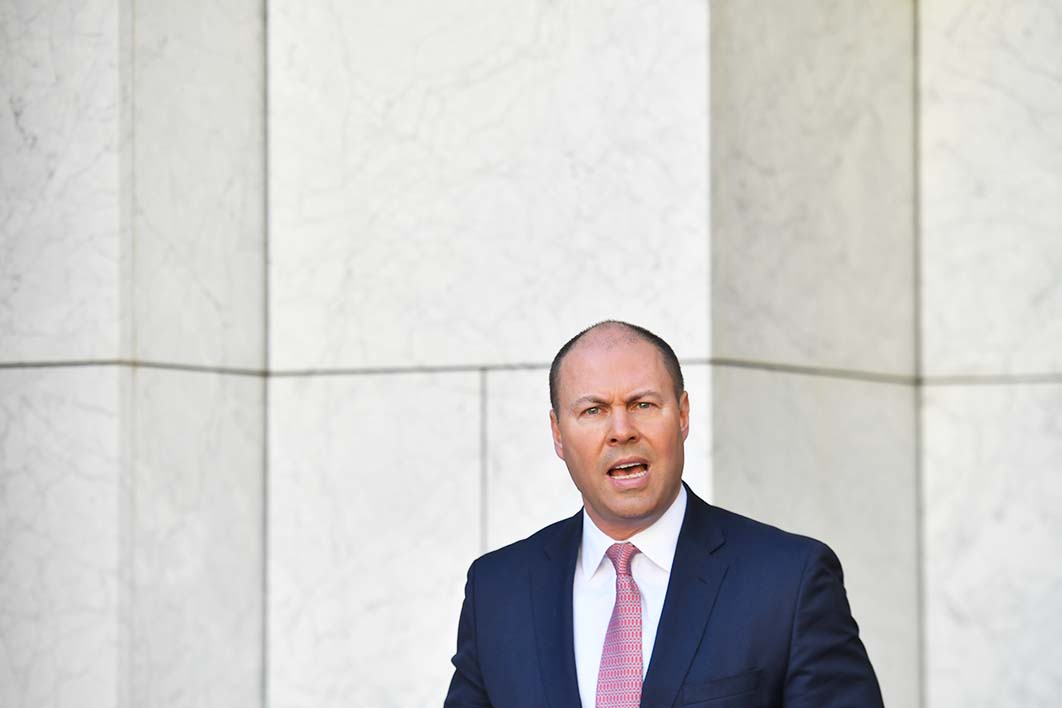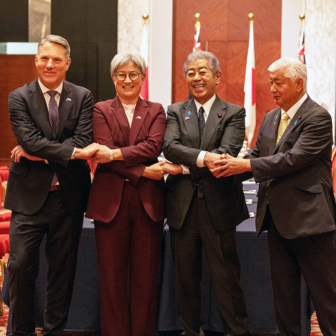What do hostage-taking, three-legged races and employee share schemes have in common? All three are about aligning incentives. Police don’t shoot at bank robbers when they have hostages. If your partner falls in a three-legged race, so do you. And if the company you work for does well, an employee share scheme means you do well, too.
The same is true for foreign investment. It aligns incentives. When US, Japanese or Chinese businesses and households invest billions of dollars in Australia, those countries (and their governments) have an incentive to support the Australian economy. If the Australian economy does well, so do their investments. If the Australian economy does poorly, their returns are lower.
Nowhere is this clearer than in trade. For years, Indonesia imposed restrictions on Australia’s beef exports. But now Indonesian companies have invested in Australia’s beef industry themselves, the Indonesian government’s incentive to restrict imports is significantly reduced. Why? Because they have skin in the game. Tariffs and quotas that hurt an Australian industry make little sense when you’ve got investments in that same industry. Foreign investment means more investment and more trade, which means more jobs and higher growth.
Foreign investment not only prevents trade wars, it also makes military wars more expensive. If Japan went to war with Australia, the first thing the Australian government would do is seize its assets in the country. Japanese businesses and households would instantly lose about a quarter of a trillion dollars. And that is just the tip of the iceberg. The trade between our countries means Japan would lose a major supplier of industrial materials and energy. The movement of people between our countries means it would be abandoning around 100,000 Japanese residents in Australia. Cutting tourism and commercial links would reduce Japanese prosperity and living standards.
Economic integration makes war expensive, and that’s a wonderful thing. Australia’s high level of foreign investment makes us an attractive ally and an expensive enemy. It is no coincidence that countries whose security and sovereignty is shaky also tend to have limited investment, trade and people-to-people links with other countries. The cost of invading countries like some of those in the Middle East, Africa and Latin America is low. No wonder it happens so frequently.
There’s another reason these countries are more prone to be invaded: they are usually poor and divided societies. This is the other major way foreign investment increases security: it makes us richer. Gina Rinehart is much more secure than the homeless person begging on the street. The same is true internationally. Having a strong economy is what allows Australia to finance its military and ensure a prosperous and united society through generous social safety nets and public investments in infrastructure, education and healthcare. Poor, divided countries are much easier to topple (from inside as well as outside) than rich, united ones.
People who oppose foreign investment are often suspiciously silent about the costs of being closed to investment. Australia needs foreign investment because we don’t save enough to finance the investment we need in our economy to maintain our high standards of living.
The total stock of foreign investment in Australia is almost $4 trillion. This is $4 trillion that, in the absence of foreign investment, would come from the pockets of Australian households and businesses. No foreign investment would mean less consumption for households and businesses, who would then need to save more, along with higher interest rates on mortgages, credit cards and business loans.
The narratives used by those who oppose foreign investment are also based on a false counterfactual. They assume that if a foreigner hadn’t invested in that project (a project that creates jobs and growth for the economy) the project would have gone ahead anyway.
This is sloppy economics. If local savings were available to finance the project at a rate comparable to those from overseas, there would be no foreign investment. The fact that foreign investment takes place means that those projects needed foreign investment. There were no Australian substitutes jumping in when Japanese car factories closed in Victoria and South Australia.
Recent concern about foreign investment during Covid-19 is based on a belief that foreigners will swoop in while the economy is weak to buy cheap and distressed assets. But if the counterfactual is that those businesses would otherwise have collapsed — destroying jobs and capital in the process — surely allowing foreign investors to save them is preferable.
Indeed, this is the whole point of having a floating exchange rate: it acts as an automatic stabiliser. When the economy is weak, the exchange rate weakens, making our exports cheaper and, importantly, making investment in our economy more attractive. By closing off foreign investment during Covid-19, the government has made the pandemic more damaging and our recovery slower.
None of this is to say that foreign investments never carry security risks. There are well-documented examples of governments or government-backed companies investing to gain a geopolitical advantage. But there are also significant security risks in not having foreign investment. It is this observation, rooted in basic economics, that is increasingly absent in Australia’s foreign policy discussion. The objective should not be to demonise foreign investment. The objective should be to make the risks that come with foreign investment as small as possible.
The government’s proposed changes to Australia’s foreign investment regime are still being developed, but the preliminary proposals are worrying. The problem with Australia’s existing foreign investment regime is that it tends to be opaque and arbitrary. Both those features are toxic to investment. The current reforms risk adding more opacity and arbitrariness to a system that already has too much of both.
The vague definition of a “sensitive national security business” and the proposed ability to forcibly divest a previously approved purchase are worrying. At best, these changes will raise transaction costs, making marginal investments no longer viable. At worst, they will raise risk premia across the board as well as the perception of sovereign risk, making whole investments from entire countries unviable. The cost of doing business in Australia has just gone up. Investment will simply flow elsewhere.
More worryingly, the proponents of greater restrictions ignore the enormous risks. They are silent on the security benefits of foreign investment and the fundamental role it plays in increasing the cost of conflict, aligning the incentives of foreign governments with ours, and strengthening our economy and thus our security. There are more effective ways to manage risk than to shut it out.
The Australian government is not alone. Governments around the world are tightening the screws on foreign investment. With geopolitical tensions already high, they couldn’t have picked a worse time.•




